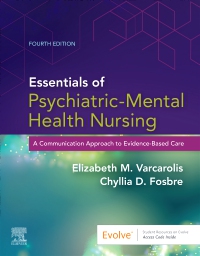
Essentials of Psychiatric Mental Health Nursing - Elsevier eBook on VitalSource, 4th Edition
Elsevier eBook on VitalSource

A 2017 AJN Book of the Year Award winner, Essentials of Psychiatric Mental Health Nursing: A Communication Approach to Evidence Based Care, 4th Edition, offers the perfect balance of essential nursing interventions and clinical content. It incorporates a reader-friendly style and an emphasis on therapeutic communication and evidence-based practice. Perfect for shorter psychiatric nursing courses, this streamlined psychiatric text includes need to know information and key DSM-5 content students need to pass their course and prepare for the NCLEX®. A neurobiology of the brain teaching tool provides a visual depiction of how the disorder affects brain function — and what drugs are used to treat it. Additionally, this new edition includes Giddens Concept boxes, Integrative Care boxes, updated clinical disorders chapters, and new use of nursing diagnosis language International Classification for Nursing Practice (ICNP) which smooths students’ transition into practice, as this is a common language shared with many electronic health record documentation systems.
Newer Edition Available
Varcarolis’ Essentials of Psychiatric Mental Health Nursing - Elsevier eBook on VitalSource
-
- NEW! Integrative Care boxes address alternative therapies to treat psychiatric illnesses.
- NEW! Giddens Concept boxes at the beginning of each chapter tie to the topics discussed in that chapter.
- UPDATED! Clinical disorders chapters such as Schizophrenia, Bipolar Disorders and Somatoform Disorders, and many others reflect the latest evidence -based research and practice.
- NEW! ICNP nursing diagnosis language smooths students’ transition into practice, as this is a common language shared with many electronic health record documentation systems.
- UPDATED! Cultural Considerations sections include more updated and relevant material, whenever possible in the clinical chapters, and address cultural considerations with various patients and appropriate care.
- Neurobiology of the brain feature provides students a visual depiction on how the disorder affects brain function and what drugs are used to treat the disorder.
- Applying Evidence Based Practice boxes throughout the clinical chapters pose a question, walk the student through the process of gathering evidence-based data from a variety of sources, and present a plan of care based on the evidence.
- Vignettes describing psychiatric patients and their disorders add more practical application to the chapter material.
- DSM-5 diagnostic criteria identify medical diagnostic criteria for most major disorders.
- Applying Critical Judgment introduces clinical situations in psychiatric nursing at the end of all chapters with thought provoking questions that engage critical thinking.
-
- NEW! Integrative Care boxes address alternative therapies to treat psychiatric illnesses.
- NEW! Giddens Concept boxes at the beginning of each chapter tie to the topics discussed in that chapter.
- UPDATED! Clinical disorders chapters such as Schizophrenia, Bipolar Disorders and Somatoform Disorders, and many others reflect the latest evidence-based research and practice.
- NEW! ICNP nursing diagnosis language smooths your transition into practice, as this is a common language shared with many electronic health record documentation systems.
- UPDATED! Cultural Considerations sections include more updated and relevant material, whenever possible in the clinical chapters, and address cultural considerations with various patients and appropriate care.
-
Unit I: Essential Theoretical Concepts for Practice
1. Science and the Therapeutic Use of Self in Psychiatric Mental Health Nursing
2. Mental Health and Mental Illness
3. Theories & Therapies
4. Biological Basis for Understanding Psychopharmacology
5. Settings for Psychiatric Care
6. Legal and Ethical Basis for Practice
Unit II: Tools for Practice of the Art
7. The Nursing Process in Psychiatric-Mental Health Nursing
8. Communication Skills: Medium for All Nursing Practice
9. Therapeutic Relationships and the Clinical Interview
UNIT III: Caring for Patients with Psychobiological Disorders
10. Trauma and Stress-Related Disorders and Dissociative Disorders
11. Anxiety, Anxiety Disorders, and Obsessive-Compulsive and Related Disorders
12. Somatic Symptom Disorders and Related Disorders
13. Personality Disorders
14. Eating Disorders
15. Mood Disorders: Depression
16. Bipolar Spectrum Disorders
17. Schizophrenia Spectrum Disorders and Other Psychotic Disorders
18. Neurocognitive Disorders
19. Substance-Related and Addictive Disorders
UNIT IV: Caring for Patients Experiencing Psychiatric Emergencies
Introduction
20. Crisis & Mass Disaster Intervention
21. Child, Partner, and Elder Violence
22. Sexual Violence
23. Suicidal Thoughts and Behaviors
24. Anger, Aggression, and Violence
25. Care for the Dying and Those Who Grieve
UNIT V: Age-Related Mental Health Disorders
26. Children and Adolescents
27. Adults
28. Older AdultsAppendix




 as described in our
as described in our 